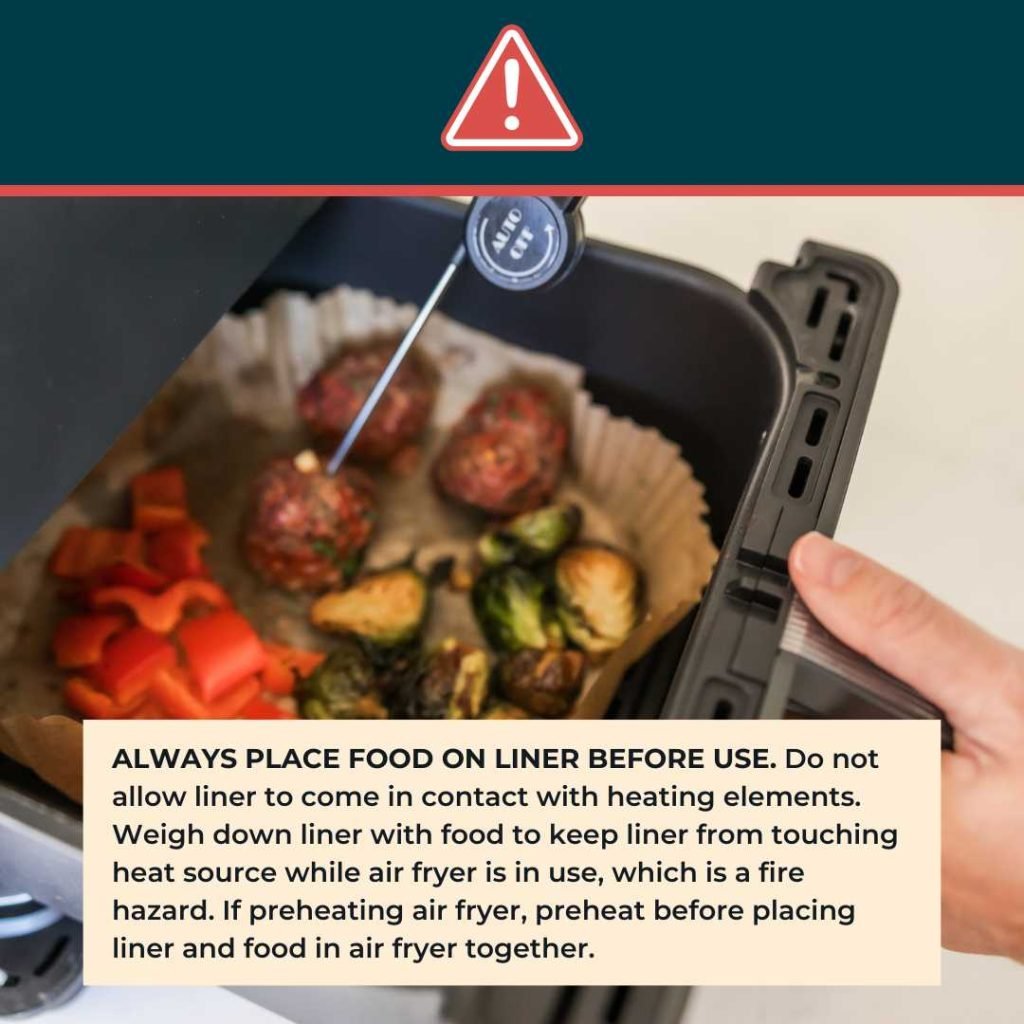Avoiding certain items in your air fryer is essential for safety and optimal cooking. Never put wet batter, fresh herbs, or fried foods that are overly greasy directly into the basket, as they can cause smoking or damage. Instead, use appropriate methods to prepare your dishes for the best results.
In short, you should steer clear of foods that can create excessive splatter, mess, or damage the appliance, such as wet batters or greasy ingredients. It’s also important to avoid metal utensils and certain plastics that aren’t heat-safe to prevent accidents or damage. Knowing what not to put in your air fryer helps ensure safe operation and delicious meals every time.
Jumping into air frying without knowing what’s off-limits can lead to mishaps or poor results. Many beginners wonder which foods or items are forbidden in this popular kitchen device. While it’s incredibly versatile, certain things simply don’t belong in your air fryer—whether because they can cause smoke, damage the machine, or pose safety risks. Being aware of these limits helps you avoid common pitfalls and keeps your cooking fun and safe. From wet batters to certain plastics, understanding what’s not allowed ensures your air fryer lasts longer and produces the best-tasting dishes.
What is not allowed in the air fryer?
Introduction
The air fryer is a popular kitchen appliance that lets you cook food quickly with less oil. However, there are certain items and materials that should never go into an air fryer. Knowing what is not allowed helps keep your appliance safe and cooking efficiently. This guide covers all the things you should avoid placing in your air fryer to prevent damage or accidents.
Items Made of Flammable Materials
Anything made from flammable substances cannot go into the air fryer. For example, paper towels, paper plates, or napkins can easily catch fire during cooking. Keep in mind that even small pieces of paper or cloth can ignite if they come into contact with hot surfaces or heating elements. Always use oven-safe, heat-resistant containers when cooking in your air fryer.
Plastic and Rubber Items
Plastic containers, wraps, or utensils should never go into the air fryer. These materials are not designed to withstand high temperatures and can melt or release harmful fumes. Rubber silicone baking mats or oven silicone tools are safe options, but only if they are labeled as heat-resistant and suitable for air frying.
Wet or Raw Foods That Are Not Suitable for Air Frying
Some wet or raw foods may not cook evenly or can cause messes inside the air fryer. For instance, raw or wet batter-coated foods like tempura or pancake batter can drip and create a mess. Instead, use a baking paper or a silicone mat to catch drips. Also, avoid placing overly moist foods directly on the basket without a protective layer.
Foods with Excess Oil or Liquids
Foods with too much oil or liquids should be avoided as they can cause splattering inside the air fryer. This includes greasy fried foods or dishes with a lot of broth. Excess oils can cause smoke or make cleaning difficult. Use minimal oil or drain excess liquids before cooking.
Foods that Are Too Large or Dense
Large, dense foods like whole chickens or large roasts might not cook properly in an air fryer. The appliance works best with smaller, evenly-sized pieces. Overstuffing the basket can lead to uneven cooking and longer cooking times. Cut larger foods into smaller pieces for better results.
Alloys and Metals Not Air Fryer Safe
While metal is generally safe in an air fryer, certain alloys or metals with coatings may not be. Avoid using pans or containers with non-stick coatings that are scratched or damaged as they can flake off during cooking. Always use cookware specifically labeled as oven or air fryer safe.
Non-stick Cookware with Damaged Coatings
Non-stick pans that are scratched or peeling can release harmful chemicals into your food when heated. Avoid placing damaged non-stick cookware inside the air fryer. Use alternatives like stainless steel or ceramic-coated cookware that are intact and designed for high heat.
Items with Sharp Edges or Points
Sharp objects such as knives, metal skewers, or utensils with pointed tips should never be placed in the air fryer basket. These can damage the basket or heating element, or cause injury when retrieving food. Use appropriate tools when handling foods in the air fryer.
Foods with Skin That Can Pop or Explode
Certain foods like whole potatoes or sausages with skin can sometimes explode if not prepared correctly. Poking holes in potatoes or sausages before air frying helps prevent pressure buildup. Be cautious with foods that tend to splatter or pop during cooking.
Items with Wrapping or Packaging
Packaging like plastic wrap, foil, or store-bought crisper bags should not go into the air fryer. These materials are not heat-safe and can cause fires or release toxic fumes. Always remove packaging and transfer food into suitable containers or liners.
Foods Requiring Long Cooking Times
Foods that need long braising or simmering are not suitable for air frying. The appliance works best with quick-cooking foods. For slow-cooked meals, consider using a slow cooker or oven instead, as air fryers do not provide the consistent moist heat needed.
Using the Wrong Cooking Containers
Not all cookware materials are compatible with an air fryer. Avoid using glass or ceramic dishes that are not labeled as oven-proof or heat-resistant. Also, avoid thin or flimsy containers that can warp or tip during cooking. Instead, opt for sturdy, oven-safe options.
Foods with Excess Sugar or Sauces
Foods coated heavily with sugar or sticky sauces may burn or cause smoking inside the air fryer. For example, glazed donuts or sweet-soy marinade dishes can caramelize too quickly. To prevent this, apply sugary toppings after cooking or use lower temperatures.
Items Not Approved by Manufacturer
Always check your air fryer’s manual for specific guidelines. Some brands prohibit certain accessories or items. Using unapproved accessories can void your warranty or cause damage. Stick to manufacturer-recommended materials and accessories.
The Importance of Proper Cleaning and Maintenance
Avoid placing dirty or greasy items in the air fryer. Excess residue can cause smoking or unpleasant odors during cooking. Regularly clean the basket and heating element, and check for damage or wear to ensure safe operation.
Summary of Key Points
- Never put flammable materials like paper or cloth inside.
- Avoid plastic and rubber items that aren’t heat-resistant.
- Remove excess oil and liquids before air frying.
- Use appropriately sized, suitable cookware.
- Remove packaging and unapproved accessories.
- Follow the manufacturer’s guidelines for use and cleaning.
Having a clear understanding of what is not allowed in your air fryer helps keep it operating safely and efficiently. Always prioritize safety and proper use to enjoy healthy, delicious meals with your beloved appliance.
Doctor Explains “Toxic” Air Fryers!
Frequently Asked Questions
Are there any types of plastic containers that should not be used in the air fryer?
Yes, you should avoid using plastic containers that are not labeled as oven-safe. Non-oven-safe plastics can melt or release harmful chemicals when exposed to high temperatures. Always opt for cookware made from heat-resistant materials like metal, silicone, or glass designed for oven or air fryer use.
Can you cook greasy or heavily battered foods in an air fryer?
Cooking heavily battered or greasy foods can cause excess splattering or smoking in the air fryer. The batter may also stick to the basket, making cleaning difficult. It’s best to use light coatings and pat foods dry before cooking to prevent messes and ensure even cooking results.
Is it safe to put aluminum foil or parchment paper directly in the air fryer?
While you can use aluminum foil or parchment paper, you should do so with caution. Avoid covering the entire basket, as this can block airflow and hinder cooking. Place foil or paper beneath foods or use them to line the basket, ensuring they don’t touch the heating element or impede proper air circulation.
Are there any foods that should be avoided due to potential safety issues?
Foods with high moisture content, like wet batter or very watery ingredients, can cause spattering and potential damage. Also, foods that produce excessive smoke or fumes, such as oily or spicy items, should be prepared with caution. Always follow the manufacturer’s instructions for safe use.
Can I use metal utensils or sharp objects in the air fryer?
No, it’s not recommended to insert metal utensils or sharp objects into the air fryer while it is operating. These can damage the non-stick coating or heating elements. Use heat-safe silicone or wood tools for handling food to prevent damage and ensure safety.
Final Thoughts
What is not allowed in the air fryer? Avoid placing wet batters or foods with high moisture content, as they can cause splattering and mess.
Do not cook whole poultry without trussing or proper preparation, since uneven cooking can occur.
Plastic or fragile materials should never go inside the air fryer, as they can melt or release harmful fumes.
In summary, the main restriction is to keep out anything that may damage the appliance or cause safety issues. Knowing what is not allowed in the air fryer ensures safe and effective cooking every time.
As an Amazon Associate, We earn from qualifying purchases. When you purchase a product through Amazon links on kitchenadvising.com, we may earn a small commission at no extra cost to you. This helps support the site and keep our content free.


